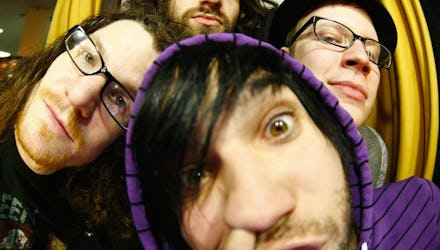Loving Fall Out Boy Is the Most Rock and Roll Thing I've Ever Done

In 2005, I got arrested three times. I was a 16-year-old punk, and I did stupid shit: I was in a police stand-off, broke a hot tub, snowboarded through a wall, got caught having sex in the back of a car, stole jeans from the mall, caused multiple unreported car accidents and did better keg stands than anyone I've met to this day. Like any pissed-off teenager, I had a soundtrack for the havoc: Fall Out Boy.
FOB was my Nirvana, my Sex Pistols, my Radiohead. I was an angry, confused kid who didn't quite fit into a neat role because I was lots of things: star pupil, law-breaker, volleyball player, weed enthusiast. And FOB was just like me. Unlike the hipper, less commercial, nonconformist punk bands, FOB got flak for not fitting into a neat role: too punk for the pop crowd and too pop for the punk crowd. Punk hated them, critics were confused by them and music purists loathed their sound.
Like me, they were misunderstood. They were uncool. And that's what made me love them. That's what made this seemingly lame band the closest thing I had to rock 'n' roll.
The amount of FOB hate in 2005 was shocking, even by today's troll-happy standards. As Punkrock.org observed back then, "What is it about Fall Out Boy that makes everyone pick up arms and march off to war? With all the Internet shit-talking, you'd think they were the anti-Christ (or the return of Christ, depending on your particular belief), but they're not." Among the hundred or so responses to that article was the more or less typical rebuttal "FOB is TOTALLY gay." Music critic Robert Christgau wrote, "These Warped Tour cover boys aren't terrible, but are they ever ordinary," and IGN declared, "Whenever an album like From Under the Cork Tree crosses my desk, I'm reminded that we cannot blame the children."
Yet for all the hate, From Under the Cork Tree, FOB's second studio album, quickly reached the top 10 of the Billboard 200 after its release. Plenty of bands are hip but aren't commercially successful. FOB was nearly universally uncool, yet utterly marketable to a certain niche, which is one of the quickest ways to convince people not to care about your music. But for me, deep in the throes of my teenage rebellion, the FOB hate only made the band's journey more personal. It meant we were going through something together, and that feeling of camaraderie was something I needed in my life.
It's not like I had a bad childhood; my parents were married and my future was bright. But I struggled for a long time with Tourette's. I didn't shout obscenities in crowded department stores. Instead, my Tourette's manifested itself in short vocal tics. I squeaked like a rusty wheel. But for all the pain it caused, the disease made me tough. I learned to stand up for myself, and not to take shit from anyone. It also made me angry and closed-off — I didn't trust a single person in the world except Pete Wentz, FOB's lyricist. Whenever things got tough, I knew that FOB would be there at the end of the day, waiting in my car stereo. The fact that everyone else seemed to hate the band just meant more for me.
In a Rolling Stone review of Infinity on High, Rob Sheffield wrote, "Fall Out Boy need non-fans to hate-hate-hate them the way Young Jeezy needs people to think he really sells drugs." That was exactly the best part of being a FOB fan (and likely the reason for their early commercial success): You felt like the only fan in the world. When Patrick Stump sang, "We're the therapists pumping through your speakers / Delivering just what you need," it was true, and it was just for me.
But bands grow up, just as their fans do. FOB finally proved haters wrong when 2007's Infinity on High turned out to be both successful and critically acclaimed. Entertainment Weekly wrote, "Lo and behold, it turns out these pasty emo boys are a pretty great blue-eyed soul band." Of course, I had known this all along. And of course I was peeved when people jumped on the bandwagon I'd been riding for years; after all, they were taking up the space I'd been working so hard to carve out for myself. But more importantly, I was 18 and leaving for college. By then, I'd mostly outgrown my Tourette's, and with it I'd started to outgrow my band. It wasn't that I didn't like them. We just didn't need each other any more.
This week, American Beauty/American Psycho became FOB's third album to hit No. 1 on the Billboard 200. Now I'm 25 and I feel only marginally embarrassed about my law-breaking streak, but it took longer to get over my embarrassment of being a FOB fan. I can finally look back and appreciate that the band helped me through some really hard times. We were inseparable for years, but after we grew apart, we also grew into our own.